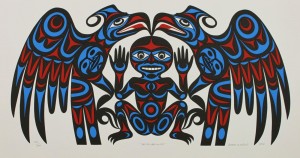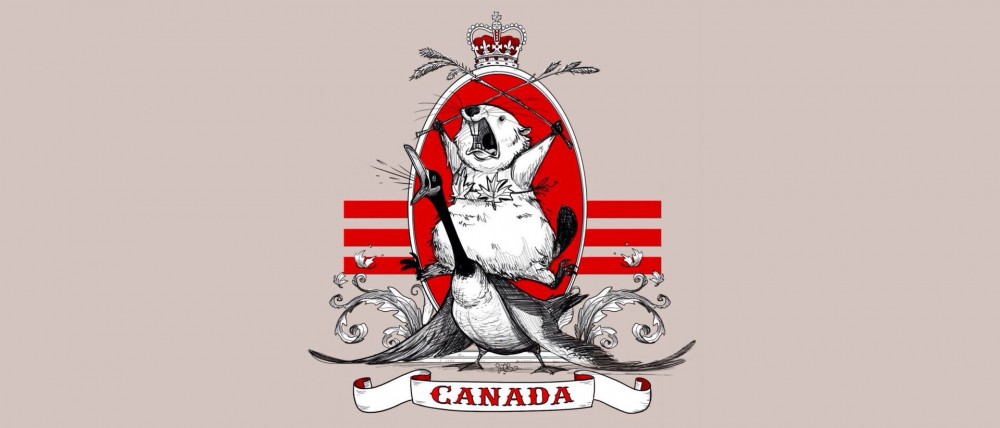Assignment 2.6:
5) “To raise the question of ‘authenticity’ is to challenge not only the narrative but also the ‘truth’ behind Salish ways of knowing “(Carlson 59). Explain why this is so according to Carlson, and explain why it is important to recognize this point.

Salish Welcoming by Joseph Wilson
In Carlson’s article, Orality and Literacy: the ‘Black and White’ of Salish History, he outlines how Salish histories challenge, dispute and question our Western history and ways of knowing. When conflicting histories arise between Western and Indigenous groups we tend to question Indigenous histories rather than our own. We consider ourselves the ultimate fact keepers, and in many ways we are. Whether it is our history of settlement or an academic paper it is protocol to acknowledge our sources. We keep meticulous records of events and everything is written down, but much of Canada’s history is skewed in the settlers’ favour. After all “History is written by the victors” (Winston Churchill).
With the certainty we hold in our own history it leads us to question other accounts. In the case of Carlson’s article he discusses the consequences of questioning the authenticity of Salish history, and shows how the Salish are meticulous record keepers too. In fact “historical accuracy in the Salish world is a matter of great concern…” (Carlson 57). Since Salish histories were not written down they assessed the accuracy of stories by comparing them to the previous renditions of the same story (Carlson 57). Listeners would have to remember the other versions they had heard of the same story and determine if the storyteller was accurate enough. Carlson also references Wendy Wickwire about the process which she calls “oral footnotes” (57). Oral footnotes are when a storyteller verbally cites their sources or other forms of authority to establish their legitimacy as a storyteller. For Salish storytellers oral footnotes are essential to establishing one’s authority as a reliable and good storyteller. If one did not do this their story, particularly if it was a historical narrative, would have been regarded as poor history (57 Carlson). Tellers of poor history would have faced consequences for their poor storytelling. They would “acquire reputations as poor historians: their status [in the community would] diminish” (Carlson 57). It would have been horrible for ones social standing if they told an inaccurate account of a story.
Storytelling is ingrained in Salish culture and truth is essential to their stories. Carlson says “To raise the question of ‘authenticity’ is to challenge not only the narrative but also the ‘truth’ behind Salish ways of knowing” (Carlson 59). As I outlined above, truth and authenticity when recounting stories is highly valued. The Salish people do not value authenticity any less than the settlers. By questioning the authenticity of their narratives we also question their deeply ingrained cultural practices. It says we don’t recognize that they are capable of keeping reliable records because nothing is written down. In a culture so concerned with the authenticity in their storytelling this is an insult. It is Western culture saying over and over again your record keeping is not as valid as ours. So when we do question the authenticity of Salish history we should do so cautiously and respectfully. We should recognize how they keep historical accuracy in their culture, and why it is important to them.
I think it is important to recognize Carlson’s point because more often than not misunderstanding of culture allows policy makers to create biased laws and regulations which favour the settler. For example, Carlson points out “how a false understanding of Native history allowed American policy makers to… [justify] the physical, social, and economic marginalization of Aboriginal people.” (58). Western culture values our historical accuracy, but I think it is essential to learn our version is not the only version of history.
Works Cited:
Carlson, Keith Thor. “Orality and Literacy: The ‘Black and White’ of Salish History.” Orality & Literacy: Reflections Across Disciplines. 43-72. Print.
Robbins, Michael. “Letter From Military History – January 2013” HistoryNet. History Net, 02 Nov. 2012. Web. 05 Mar. 2016.
Wilson, Joseph. Salish Welcoming. Digital image. Cedar Hill Long House Art Publishing. Cedar Hill Long House, 1 Sept. 2006. Web. 5 Mar. 2016.
Wonders, Dr. Karen. “Coast Salish.” First Nations: Land Rights and Environmentalism in British Columbia. University of Goettingen, 8 Nov. 2008. Web. 05 Mar. 2016.

Hey Nicole,
You make some very clear points—I particularly like your quotation about Winston Churchill. As an anthropology student, I’m constantly being reminded how we have been raised to see everything from a Western perspective, which was built on a foundation of colonialism.
I agree it’s unfair that that the authenticity of the Salish peoples is questioned because their stories from a place of orality, instead of written. They have their own way of ‘citing’ things in oral culture, but ultimately they rely on human memory, which is a flawed system, as is discussed in the following piece:
http://www.newyorker.com/science/maria-konnikova/idea-happened-memory-recollection
In the same stream of thought, often we rely on written accounts based on the memory of people who wrote them when discussing Western narratives. Now, however, with the proliferation of technology and recording devices, do you think it’s now possible to record completely ‘truthful’ stories? For example, I write for a magazine and conduct interviews, and I’m expected to record the interviews for both my own convince and fact-checking purposes, and in the case that a subject denies that they said something. What does this mean for storytelling in the future?
Hi Natalie,
Thank you for your comment and the interesting article.
I would agree with you that human memory is a flawed system. There is countless evidence (like the article you linked) that first hand witness accounts are not reliable, yet memory is all we have. All of our history is from memory the only difference is that Europeans wrote it down. So yes it is probably more likely that it did not get changed too much over time, but that was also the goal of Salish narrative practices.
I don’t think, even with our technology, it is possible to record completely ‘truthful’ stories. No one person’s account is true. It is influenced by their biases, previous experiences, or even intentional manipulation of the story. I think Edward Chamberlin does a good job at illustrating how important multiple truths are. I don’t think there is such a thing as one truth, but by listening to the multiple truths equally we would be able to see as much ‘truth’ as possible.
Hi Nicole,
I really like your reflection to this discussion question. I think the concern of authenticity is also deeply intertwined in the debate of “Oral Culture” vs. “Written Culture”. European History has been written down for over a thousand years and that is, as you suggested, how we have maintained such accuracy. As you also explained, Salish History has been shared orally, however they still care about maintaining accuracy and checking their sources.
From a European perspective, keeping track of history through oral narratives is unheard of. There is the assumption that if it isn’t written down, the information will be lost, forgotten, or mixed up. However, it is obvious that the Salish have their own ways of ensuring information is kept accurate. I think the European assumptions of what’s right & wrong in the context of recording history were made without even trying to understand how Salish communities kept their own histories accurate. As you said, these assumptions not only question accuracy, but the culture of the Salish people.
Hi Julia,
Thanks for the comment! I definitely agree that Europeans assumed keeping track of history without writing it down was wrong and they made these judgments without properly understanding Native culture. I hope as time goes on the world can become more educated in Native culture and not make these mistakes anymore.
Nicole
Hi Natalie,
Great post! It is interesting when thinking about different histories and how people often do not question their own history or narratives. Perhaps it is because humans have the tendency to believe that their own culture or history may hold a higher importance within their lives. Also, I think there is a strong awareness or tendency to believe that everything is derived from a western point of view, perhaps due to historical past and colonialism. However, I agree with you Natalie that the Salish people are not treated equally just because of their own particular stories. I think this brings in the whole aspect of how important it is to also be aware that each culture in terms of their written or oral is different and dynamic. I think narratives should be looked at in a more fluid kind of way instead of static.
But once again,
thanks for sharing your thoughts!
Karen
Hi Karen,
Thanks for the comment. You make a great point at narratives being more fluid than static.
Nicole